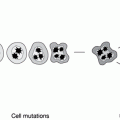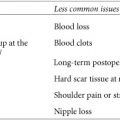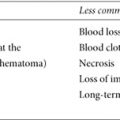Chapter 7
Decoding Your Test Results
THE WAIT IS OVER. You’ve wondered, worried, and anxiously anticipated your test results. Now you’re about to find out whether you’re indeed at high risk or if you can perhaps breathe a sigh of relief. But that piece of paper in your hand may not completely clarify your cancer risk. It’s important to speak with a genetics expert about your results, no matter what they are, so that you understand the implications for you and other family members. BRCA testing produces three categories of results: “positive for a deleterious mutation,” “no mutation detected,” or a “variant of uncertain significance.” Here’s a review of all three.
Life, Interrupted: It’s Positive
It’s probably the last thing you want to hear: positive for a deleterious mutation means you have a known mutation in BRCA1 or BRCA2. This result also means:
• You inherited a genetic mutation from one of your parents.
• You have increased risk for breast, ovarian, and other cancers.
• Your biological siblings have a 50 percent chance of having the same mutation.
• Your cousins, aunts, uncles, and other blood relatives (on the side of the family from which you inherited the mutation) may have the same mutation.
• Your biological children have a 50 percent chance of inheriting your mutation.
Good News! You’re a True Negative
A negative result means your test didn’t find the specific BRCA mutations it was looking for. If you haven’t had cancer, a family member already tested positive for a mutation, and your single-site test shows no mutation detected, you’re considered a true negative. You didn’t inherit the family mutation, and you therefore can’t pass it on to your children. Your cancer risk is likely the same as anyone in the general population, with a remote possibility that you could have a different mutation. Other strong genetic or environmental factors may be affecting the cancer risk in your family. You should begin or continue routine screening as recommended by your doctor and genetic counselor.
When No Might Mean Maybe
If your result shows no mutation detected, it means your test showed no evidence of known BRCA mutations. In one way, that’s wonderful news. However, you might have a different mutation that requires a separate test, is in a different gene, or is one that scientists don’t know about yet. Having a negative test result doesn’t always mean you have average risk. It might imply something else, depending on your family history and the type of test you had:
• If several people in your family have cancer but test negative, something other than a BRCA mutation may be the cause. The cancer could be caused by a different hereditary syndrome or an unknown mutation. It might be a combination of gene changes or a common behavior or environmental exposure.
• If you’re the first in your family to have genetic testing, and you were tested for one of the three Ashkenazi founder mutations, no mutation detected means you have none of them. However, you might have a high risk for breast and ovarian cancer because of a different mutation, especially if both sides of your family have a history of either disease. If you’re of Ashkenazi descent, you may have a less common mutation in BRCA1 or BRCA2 that isn’t included in the founder test. A genetic counselor can explain if you or a family member might benefit from a more comprehensive, full-sequence gene test that would broadly search for other BRCA mutations.
• If your family has no known mutation and you haven’t had cancer, the next step may be testing a relative who has been diagnosed with breast or ovarian cancer. You may still be at high risk due to an unknown mutation or a mutation that wasn’t included in your test, especially if your family has a strong history of breast or ovarian cancer.
If any of these describe your situation, you should be screened closely and stay in touch with your genetics expert for new information and additional tests.
MY STORY: Acting on My Test Results
Eight of ten women in the three generations before me had breast cancer, so I was pretty sure if I had a BRCA mutation, my odds of developing breast cancer were close to 100 percent. My father’s family has a strong history of breast cancer that includes four of his six sisters (three diagnosed before menopause), two aunts (one before menopause), and both great-aunts, who were likely premenopausal when diagnosed. After I found out about my BRCA2 mutation on my 35th birthday, I was on the operating table just six months later having bilateral mastectomies.
—BETHANY
Genetic Variants
Small genetic changes aren’t always significant—a slight variation may be the difference between brown and green eyes but doesn’t affect eye function. The same is true with BRCA mutations. Some gene changes cause increased risk, while others don’t. About 1 percent of the general population has genetic changes that don’t significantly raise their risk for disease. A test result of genetic variant, favor polymorphism means you have one of these changes in BRCA1 or BRCA2 that is assumed not to raise cancer risk. A test result of genetic variant, favor deleterious means you have a gene change that is strongly suspected although not proved to be associated with hereditary cancer. When a test identifies a gene change but can’t determine whether it raises cancer risk, the result is known as a variant of uncertain significance (VUS).
When a test result shows a VUS, it means a change was recognized in a BRCA gene, but whether it increases cancer risk is unknown. Over time, as more people are tested and more is known about individual variants, a VUS may be reclassified as harmful (BRCA positive) or harmless (BRCA negative). If your test shows you have a VUS, recommended cancer screenings and risk management will be based on your personal and family medical history. These recommendations may be different from those advised for people with different test results or those in the general population. Stay in contact with your genetics specialist, so you’ll know if researchers discover new information that reclassifies your variant.
Variants of uncertain significance are considered to be uninformative tests because they don’t provide a clear answer about a person’s cancer risk. Compared to Caucasians, African Americans more often have uninformative genetic test results, especially a VUS.
When a family has a strong history of cancer and a family member’s test shows a VUS, there may be several possible explanations:
• The VUS is really a harmful mutation, but not enough research exists to conclude that it’s deleterious.
• The VUS is not harmful, and cancers that run in the family are caused by a mutation in a different gene or in an unknown gene for which there is no available test.
• The VUS is not harmful, and cancers that run in the family are due to environmental factors or a combination of genetic and environmental factors.
Stay updated, free articles. Join our Telegram channel

Full access? Get Clinical Tree







